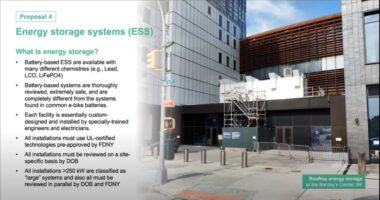by Caroline G. Harris, Esq. Goldman Harris LLC and Eric Vath, Esq. Goldman Harris LLC

A slide from the presentation of the City of Yes for Carbon Neutrality at the City Planning Commission featuring an ESS on the Barclays Center. The application was certified on April 24, 2023. Click to enlarge. Image Credit: DCP
To meet the climate goals of the 2016 Paris Agreement, New York State and New York City have adopted aggressive energy efficiency goals. The Mayor’s 2022 City of Yes program announced numerous initiatives to make the city sustainable, resilient and equitable. One of them, the City of Yes: Carbon Neutrality, aims to reduce our reliance on carbon-based fuels by modernizing the zoning rules to make our homes, businesses, electric power grid and waste stream much cleaner. A key element of the Carbon Neutrality initiative is to support an increase in the use of renewable energy sources, such as solar and wind power. To be successful, the program will require changes in the City’s zoning resolution.
Energy storage systems are needed as a back-up for renewable energy sources. Battery energy storage systems, known as BESS or ESS, take energy out of the electrical grid when demand is low and put it back when demand is high. Using the stored energy from renewable and traditional sources, these systems help to level peak- and off-peak energy generation throughout the day, and prevent brown- and black-outs during heat waves and other periods of high demand. Energy storage systems benefit all residents and businesses in the city. At the same time, they help to lower greenhouse gas emissions by reducing our dependence on fossil fuels.
When the Zoning Resolution was adopted in 1961, battery electric storage systems did not exist. The Department of Buildings currently treats them as electrical substations, which are regulated by the Zoning Resolution but are not comparable to the battery energy storage systems. Electrical substations are often massive, transforming high voltage electricity and transferring it over long distances. For these and other reasons, the Zoning Resolution requires that electrical substations obtain discretionary land use approvals, including special permits by the City Planning Commission, through the Uniform Land Use Review Procedure, and the Board of Standards and Appeals, in commercial and residential (but not manufacturing) zoning districts.
Classification a battery energy storage system as an electrical substation is inappropriate. Battery energy storage system units are compact; they store energy for future use and transfer it only a short distance when needed. Treating BESS as electrical substations unnecessarily subjects them to a lengthy and uncertain public review and approval processes, preventing or delaying their installation and hindering the achievement of the city’s renewable energy goals.
The safety of battery energy storage systems is a concern to some due to the danger of unregulated and uncertified lithium-powered batteries in e-bikes and e-scooters. These concerns, however, are unfounded. Battery energy storage systems are safe. They are designed by their manufacturers with extensive engineering safeguards. In addition, battery energy storage systems must be safety tested and certified by Underwriters Laboratories, the largest and oldest independent testing laboratory in the United States. It is only after UL has issued a certification that the Fire Department will test and validate the safety of the unit. In addition, the Department of Buildings and the Fire Department review the site-specific fire and life safety features before a battery energy storage system may be installed at a particular location. The Fire Department’s review, in particular, is recognized as the most comprehensive in the nation. Given this extensive technical review, discretionary zoning approvals are unnecessary.
The discretionary approval process for each battery energy storage system installation is a huge obstacle to achieving the city’s climate goals and the power needs of neighborhoods. Each battery energy storage system can serve only a limited geographic range because it connects directly to electrical lines in the grid. Therefore, multiple systems may be needed to cover an entire neighborhood. For example, a typical 10,000 square foot battery energy storage system can serve about 4,000 residences at one time. Subjecting numerous proposed installations to individual discretionary reviews, whether through the City Planning Commission or at the Board of Standards and Appeals, in addition to being unnecessary, is not feasible due to the cost, time and uncertainty associated with each review.
Communities are understandably concerned with the impact of a battery energy storage system on the character of the neighborhood and the streetscape, as with electrical substations and other uses under the Zoning Resolution. In lieu of a discretionary review process, the Zoning Resolution can establish standards for the protection of neighborhood character and nearby uses. Notably, the adoption of the new zoning text is itself subject to public review.
New zoning regulations to facilitate the permitting and installation of battery energy storage system are being prepared by the city and expected to be announced soon. Instead of continuing to be treated as electrical substations, battery energy storage system will have a separate use classification. A typical battery energy storage system that serves more than one building will be considered a community facility use (Use Group 4) or a commercial use (Use Group 6), depending on the underlying zoning district, and permitted as-of-right. In either case, DOB and FDNY approvals will be required. Larger battery energy storage system facilities will continue to be subject to discretionary approvals.
New zoning regulations to ease the installation of battery energy storage system should be supported. They are key to the efficacy of renewable energy, a crucial step towards making the city sustainable, resilient and equitable.
(Editor’s Note: The City of Yes for Carbon Neutrality zoning text amendment was certified by the City Planning Commission on April 24, 2023, kicking off the public review process. CityLand will continue to provide coverage on this zoning text amendment as it proceeds through the public review process.)

